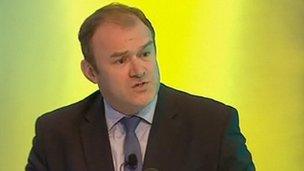Minister Ed Davey says vested interests will hate his 'Green Deal'
- Published

ED Davey said his green plans would be hated by those with vested interests
The UK's energy minister said his "Green Deal" plan for business would be so radical it would be hated by some.
Ed Davey told the Scottish Lib Dem conference in Inverness he would announce details of the project soon.
He said he was "giving notice" to businesses and local authorities to get serious about saving energy and saving people money.
Mr Davey also told the conference that he was "immensely proud" of the work done by his predecessor, Chris Huhne.
Lib Dem MP Mr Huhne resigned as energy secretary at the beginning of February after learning he would be charged with perverting the course of justice over a 2003 speeding case.
Party delegates heard Mr Davey say: "One month into the job, I now understand even more deeply than before what fabulous work Chris did to take forward the Liberal Democrats' pioneering and longstanding commitment to the environment. To make our coalition the greenest government ever."
He said he would push ahead with his predecessor's plans and go on to create a "whole new market" in the form of the "Green Deal" business model which would live "without subsidy or regulation".
Mr Davey told the conference that his ideas were so radical that there would be difficult times ahead.
He said there would be lobbying against it and there would be vested interests who would hate it.
Mr Davey warned businesses, local authorities and non-governmental organisations that they needed to get serious about "saving energy, saving the planet and saving people money".
He added: "Our claim is that we will be the first government in history to embed energy efficiency across our whole energy policy.
"The first government to seek to make reducing energy demand at least as important as how we increase supply.
"The first government to develop a market-based, self-financing scheme so every family and every home across Britain can take part in our energy efficiency drive."
Mr Davey used his speech to highlight the issue of independence, saying that England would struggle to hit renewable energy targets if Scotland voted to leave the UK.
He said: "I believe renewables are a classic case of how England and Scotland need each other. Indeed, how devolution in the UK has worked and is the best future for us all.
"Meeting our renewables target of 15% of energy by 2020 for the UK is a tough task already.
"If England has to do it for itself, by itself, it will be probably be even tougher, given Scotland has relatively more renewable sources.
"Yet the economics of renewables is that Scotland needs English consumers to help pay for the renewables, as the technology develops."
Real progress
Mr Davey also said he hoped Peterhead power station would compete for a £1bn carbon capture project.
Details of the revised competition to advance carbon capture and storage (CCS) - which is where power station emissions are caught and buried under the sea bed - will be announced later in the spring.
Mr Davey told the conference: "I know there was disappointment over the decision not to proceed with Longannet, because it would have been too expensive - but Longannet did make some real progress.
"It showed that commercial scale CCS is technically feasible - and for the first time made complete engineering designs for end-to-end CCS freely available for the whole world to see.
"As we approach the revised competition for CCS - which I hope to announce later this spring - I hope Scottish projects like Peterhead will come forward to compete."